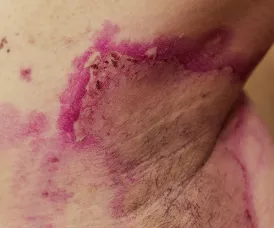A recent retrospective case series conducted in Germany explored the effectiveness of off-label ixekizumab in treating hidradenitis suppurativa (HS) in patients who had become resistant to adalimumab. The findings show promising results, with several patients experiencing significant improvements in their condition.
Patient Profile and Treatment Regimen
The study involved 10 patients, primarily female, with an average age of 39.7 years. All participants had experienced secondary loss of response to adalimumab, a standard biologic treatment for HS. The treatment regimen consisted of ixekizumab at an initial dose of 80 mg every two weeks for three months, followed by maintenance doses every four weeks.
Clinical Outcomes
Results indicated an improvement in the severity of HS symptoms. The average International Hidradenitis Suppurativa Severity Score System (IHS4) dropped from 13.6 to 9.6 after 16 weeks of treatment. Inflammatory lesions decreased in seven patients, while three patients developed new lesions during the trial. Five patients reached an IHS4 score reduction of 55% or more.
Quality of Life Improvement
Participants also saw improvements in quality of life, measured by the Dermatology Life Quality Index (DLQI). The average DLQI score decreased from 11.7 to 7.8, with two patients reporting reductions of more than 10 points, indicating a significant enhancement in their daily lives.
Limitations of the Study
Despite these positive results, the study had several limitations. The sample size was small and homogeneous, and the study was retrospective in nature. Additionally, the IHS4 score assessment used in the study may have been subjective. Further research with larger, more diverse patient populations and longer study durations is needed to confirm the long-term efficacy and safety of ixekizumab for HS patients resistant to adalimumab.
Looking Ahead
The findings from this trial align with previous studies, suggesting that ixekizumab may be a viable treatment option for HS. However, further open-label, placebo-controlled trials are necessary to fully assess the drug’s potential. With additional research, ixekizumab could become a critical option for managing HS, alongside other biologics like secukinumab and bimekizumab.
Conclusion
According to the study authors, expanding the selection of targeted therapies for HS is essential, particularly for patients who experience secondary loss of efficacy or primary nonresponse to existing treatments. The results show a promising trend for ixekizumab’s safety and effectiveness in treating HS, suggesting a hopeful future for this treatment option.
Related topics

























